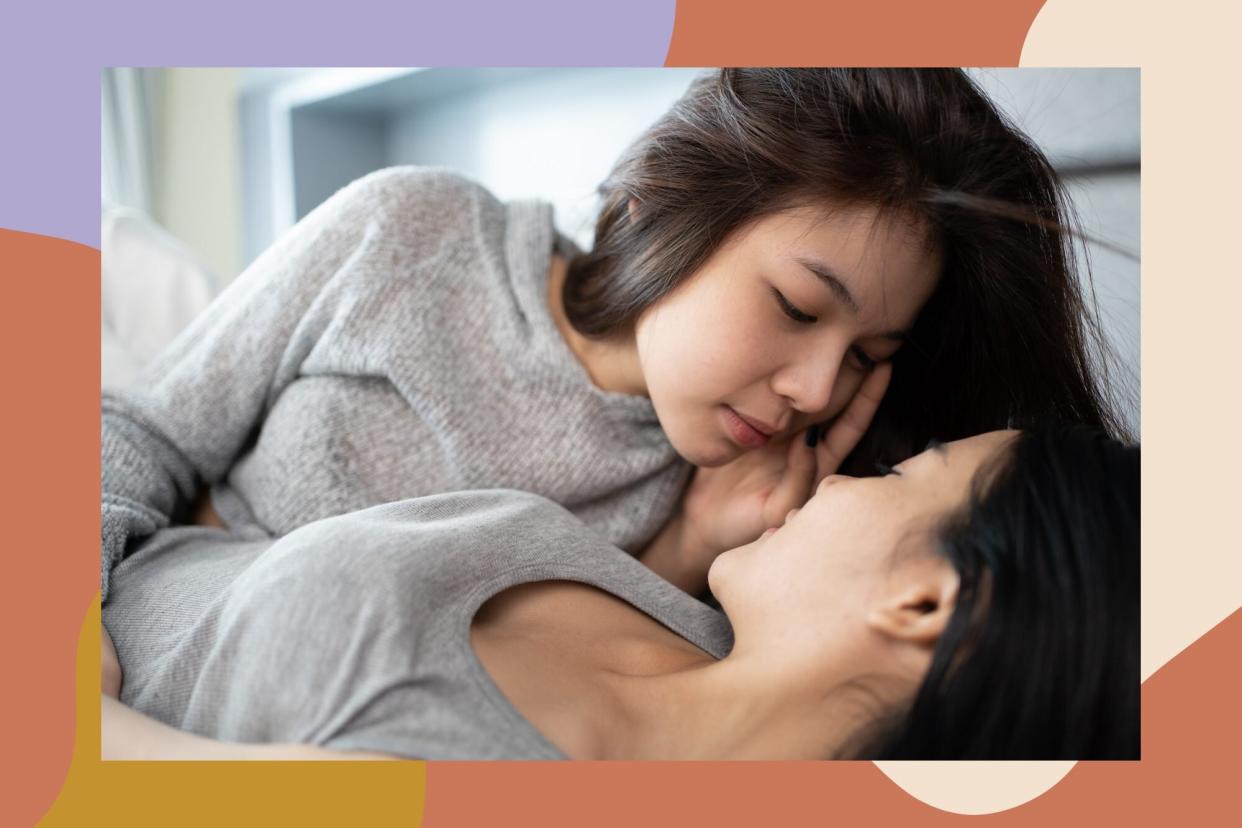This Is How Each Phase of Your Menstrual Cycle Affects Your Sex Life

Getty Images
While there's plenty of advice out there on how to have a better sex life, did you know that what works for you may actually change from week to week? Because your hormones fluctuate throughout your menstrual cycle, it makes sense that your sex life will fluctuate, too. And the more you know about these changes, the better the sex you can have.
Here's what's going on during each phase of your cycle, how it might affect your sex life, and how you can adjust your routine accordingly to increase pleasure.
Menstrual cycle phases:
The menstrual phase
Some people think of the menstrual phase—aka when your estrogen and progesterone drop and your uterus sheds its lining, otherwise known as your period—as a time not to have sex. But many people actually report an increase in their sex drive during this time, says OB-GYN Aimee Eyvazzadeh, M.D.
If you're experiencing symptoms like cramps or bloating, you understandably may not be in the mood. Sex could, however, relieve period pain, so don't automatically write it off. This is also a good time to have sex because the blood provides extra lubrication, and you're the least likely to get pregnant (though it's possible), Dr. Eyvazzadeh adds.
The follicular phase
During the follicular phase—which includes the menstrual phase and the week or two after your period—the follicle stimulating hormone (FSH) helps your ovarian follicles to grow, which, in turn, causes you to produce more estrogen, Dr. Eyvazzadeh explains.
"Your sexual desire may be increasing as you move away from your period and toward ovulation," says sexologist Sarah Melancon, Ph.D. "This phase can feel more fun and lighthearted. Playful sex like trying new toys, positions, or sex acts may be appealing at this time of the month."
Ovulation
During ovulation—which will happen over 12 to 24 hours, about two weeks before your period—an egg moves down the fallopian tube to be fertilized by a sperm.
"If we think about this evolutionarily, we could safely assume that the time of our cycle with our highest sex drive is the time when we are most likely to get pregnant," says Dr. Eyvazzadeh. "And this assumption would be true! The peak of estrogen just before ovulation tends to trigger a rise in libido."
You'll also produce more cervical fluid at this time, which may mean you'll be more lubricated, she adds. This is a good time to try to get pregnant because your eggs are ready and your cervical fluid helps sperm get through to the cervix.
Research has shown that women have more fantasies, masturbate more often, and have a greater interest in intercourse around ovulation, says Dr. Melancon. "Enjoy it! Just be safe if you're having sex with a partner and you're not interested in getting pregnant," she says.
The luteal phase
Your progesterone levels reach their peak during this phase, which lasts for about two weeks before your period, sometimes causing PMS symptoms, like breast tenderness, bloating, fatigue, and irritability, says Dr. Eyvazzadeh.
"All of these symptoms can have a big impact on our libido," she says. "When we feel uncomfortable or stressed, our bodies naturally don't want anything to do with sex." (Though, again, if you can get in the mood, sex can be beneficial for PMS.)
"As your body shifts from ovulation to the luteal phase, you will likely feel a drop in sex drive compared to its peak. Sexual interest tends to fade as this phase progresses, so don't expect to feel the same level of desire in the latter days as you do in the earlier portion," says Dr. Melancon. "In general, I advise women to listen to their bodies. Even if their partner is initiating sex, it is perfectly acceptable to say, 'Not today.'"
If you're interested in seeing how your own cycle affects your sex life, Dr. Melancon suggests using a period tracker to log the changes you notice and sharing the information you get with your partner.
Everyone's cycle is different, and not all of your cycles will be the same, so the point is not to plan your sex life around your period but to become more aware of how you're feeling. "Honor your body," says Dr. Melancon. "If your body says yes to sex, go for it! But if you'd prefer to curl up with a book and a mug of hot cocoa, take the space you need. If you're in a relationship, let your partner know your preferences for this period, so to speak."


